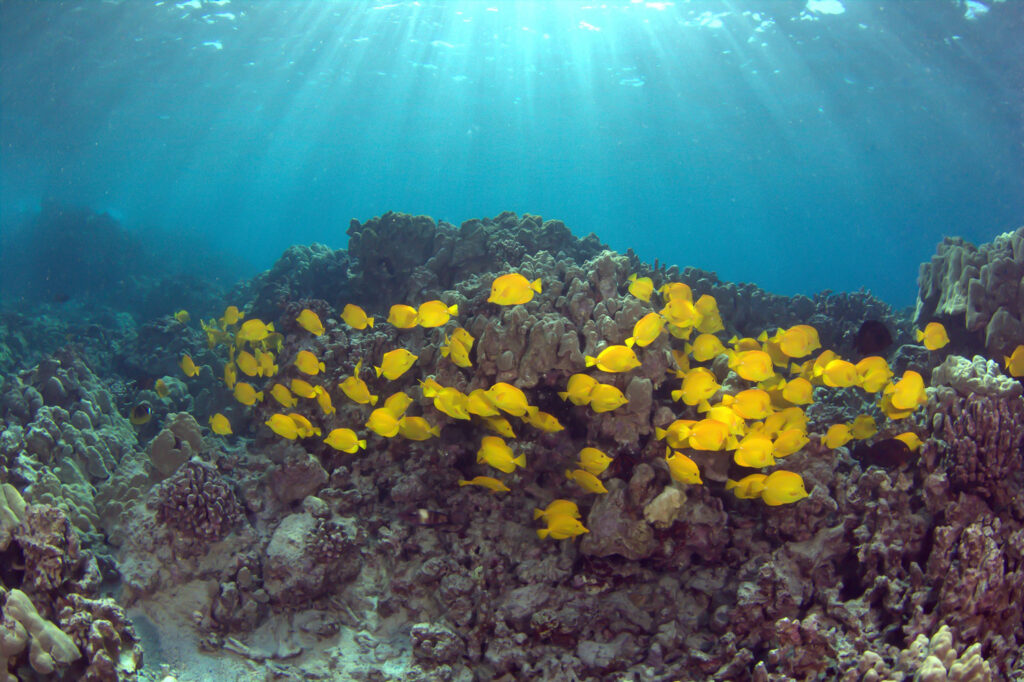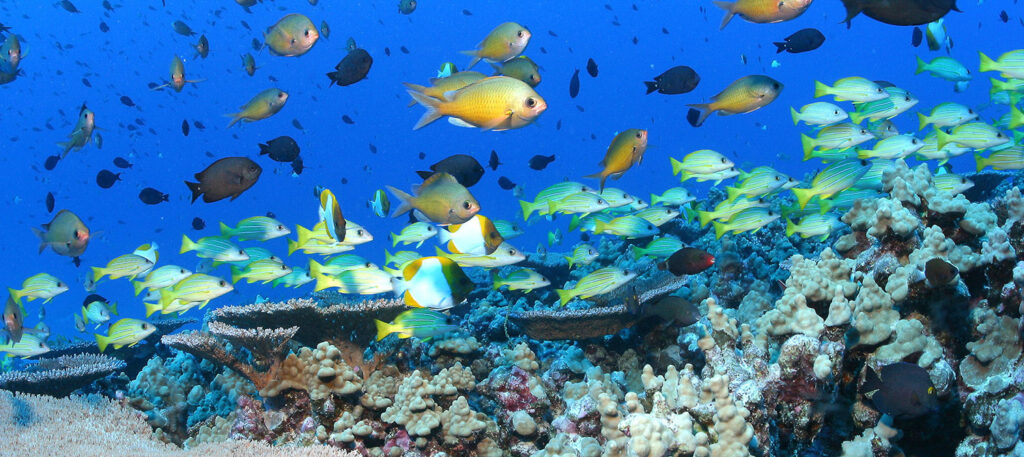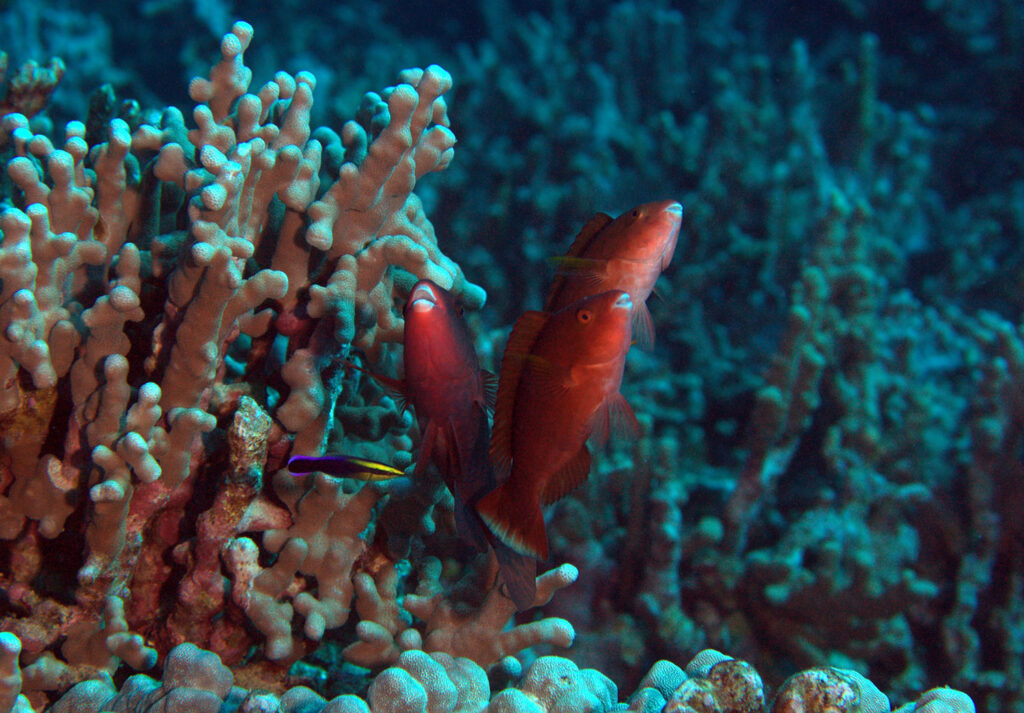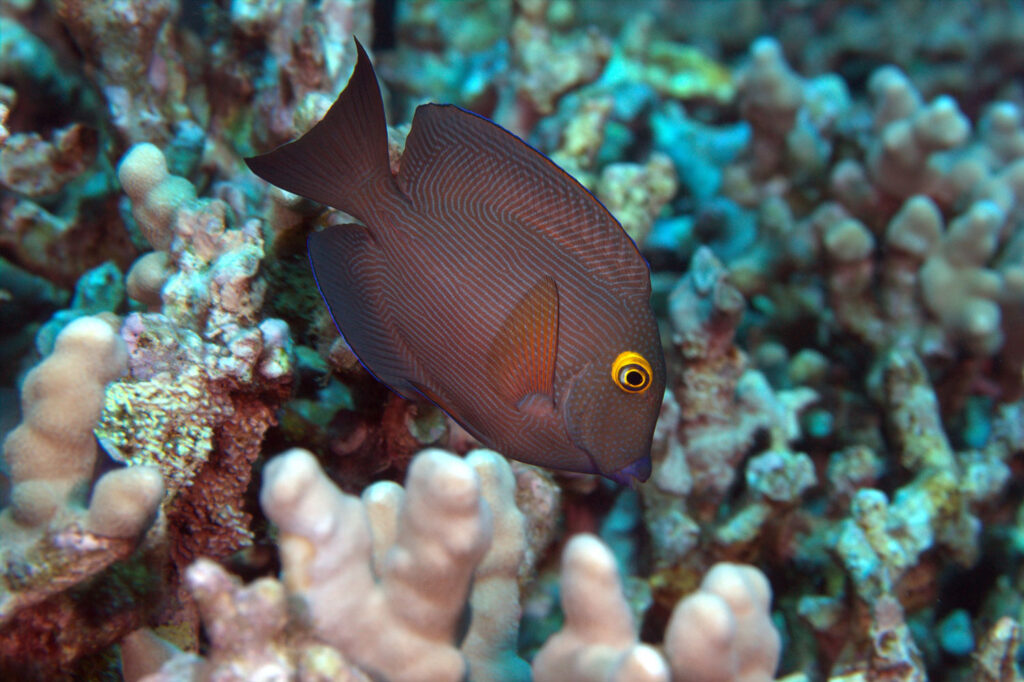What’s the price tag of coral reefs? Roughly $11 trillion. From food, medicines, recreation, and tourism to coastline protection from erosion, coral reefs benefit an estimated 1 billion people. Zoom in, and more than 330 million people reside in the immediate vicinity of coral reefs, and their livelihoods often rely on healthy reefs and their related resources. But, coral reefs face a multitude of threats, and unsustainable fishing of certain species that help our reefs is one of them.
While unsustainable fishing practices such as fishing during specific months of the year or in certain critical fish spawning threaten the future of reefs, so does fishing herbivorous fish. Herbivorous fish are ones that eat the seaweeds that would otherwise smother corals. These “lawnmowers of the reefs” include parrotfishes (uhu in Hawaiian), surgeonfishes (like manini, kole, and kala), and chubs (nenue), among others. Overfishing herbivores exacerbates the challenges that reefs already face, such as pollution. At CORAL, we recognize this critical link between pono (wise) fishing and the health of coral reefs.

While it may seem backwards, how fishing is done can actually positively impact coral reef health, and fishers can act as stewards of the ocean when fishing sustainably. But, when anyone takes too many fish, they harm not only their target catch populations but also the delicate coral ecosystem. In short, fewer herbivores means fewer corals and less reefs, so eventually less fish. Overfishing causes a vicious cycle of reef degradation.
So, why is unsustainable fishing happening in Hawaii? CORAL interviewed Dr. Mark Hixon, Endowed Professor of Marine Biology at the University of Hawaii, to learn more about the hurdles facing fishers and healthy reefs on O‘ahu.
Whether it’s fishing for sport or for commercial reasons, the challenges faced by fishers in Hawaii are complex and rooted in a history of slim fisheries management within state waters. Despite existing regulations, their ambiguity and lack of dissemination, education, and enforcement has created a chaotic scenario. When asked about the current situation of fisheries, Dr. Hixon explained that “It’s essentially a free-for-all on O‘ahu, which has led to obvious overexploitation – a classic tragedy of the commons.”
This tricky situation remains in part because when attempts are made to introduce proactive fishing regulations, pushback from a vocal minority within the fishing community often ensues. They advocate for self-regulation, perpetuating the status quo of overfishing and reef decline due to a lack of necessary herbivorous fish biomass
See Also: The Importance of Herbivore Fish in Coral Reef Health

Indeed, the movement for sustainable fishing is advocated by local respected elders, or kūpuna, within the Hawaiian communities, who are expressing their desire for change. There is hope. CORAL partner, Fish Pono – Save Our Reefs is deeply committed to educating our society regarding this need for replenishing herbivore populations.
Education, Unity, and Sustainable Fishing
Founded by Dr. Hixon and other ocean lovers as an educational outreach campaign to encourage understanding and action for sustainable fishing practices in Hawaii, Fish Pono is more than a small hui (club). According to Dr. Hixon, “it’s a growing ʻohana (family) of ocean enthusiasts, scientists, watermen and women, and fishermen who care about our Hawaiian Islands, the culture, and the reefs that surround them.” The core belief of Fish Pono lies in the power of education. Its mission is to help people understand the critical link between healthy herbivorous fish populations and the health and future of coral reefs.

Instead of dictating rules, Fish Pono aims to empower individuals to become wise, concerned, and sustainable pono fishermen and seafood consumers, fostering a sense of responsibility toward the oceans that surround Hawaii. Dr. Hixon explained that “for generations of Hawaiians, pono has been the practice of living in balance, of right action, and of acting wisely and with good purpose,” so the organization’s name speaks for itself. When asked about the primary way that fishers can act with both themselves and the ocean in mind, Dr. Hixon responded that it really boils down to “being concerned, wise, sustainable fishers who understand that it’s the herbivorous fish that keep seaweed under control and therefore keep reefs healthy.”
Advocacy in Action
Fish Pono–Save Our Reefs’ commitment to ocean conservation echoes through various community initiatives. Through compelling television and radio public service announcements, Fish Pono spokespersons convey the importance of preserving herbivorous fish alive, rather than depleting their populations. These messages are designed to reach a broad audience, directing them to social media platforms where knowledge is shared and amplified.
Additionally, Fish Pono ambassadors like US National Spearfishing Champion Kimi Werner and the organization’s esteemed local ocean scientists like Dr. Randy Kosaki and Dr. Kawika Winter serve as role models for local youth on O‘ahu. Each of the ambassadors and scientific advisors has their own unique journey and connection to the ocean, underscoring the urgency of the cause and demonstrating that every individual can make a difference.
Preserving Reefs for Future Generations
Fish Ponos’ message is clear and resonant: the decline of Hawaii’s reefs is partly due to unsustainable fishing practices, but is also a result of multifaceted challenges, including pollution. “Reef decline is due to more than just unsustainable fishing practices. But, if you want to fix the reefs that have been affected by pollution, then let’s cast fishers as the heroes that can save the reef.” By targeting less obvious species than parrotfishes and surgeonfishes that are critical to reef health, fishers can actually allow the reefs to recover while still enjoying their sport. This will pave the way for a healthier marine ecosystem.

If the current trajectory continues, Hawaii’s reefs face a bleak future. Coral bleaching, seaweed infestation, and the loss of diverse marine life are imminent threats. “Hawaii’s coral reefs are predicted to bleach every single year by 2040, and we’re going to end up with a bunch of dead reefs with a bunch of seaweed if we don’t collectively change our ways. And, once a reef is covered in seaweed, there’s no getting it back without abundant herbivores.”
Throughout his research and career, Dr. Hixon has witnessed the gradual decline of herbivorous fish populations in various reefs around the world and the impact it has had on the vitality of the reefs they inhabit. He shared that he lost his favorite reef in the Bahamas that he’d studied for 10 years: “the whole thing died before my very eyes; it was just heartbreaking, gut wrenching.” Because he wants his children and grandchildren to benefit from coral reefs, Dr. Hixon and Fish Pono remain undeterred.
Fish Pono and its mission reminds us that fighting for the preservation of our natural wonders is not just a noble endeavor but an essential one. After all, “the best thing we can ever do is fight the good fight regardless of the probability of success.” We must continue to educate ourselves and others, and always advocate for sustainable fishing. Together, we can be the saviris and guardians of Hawaii’s reefs, ensuring they thrive for generations to come.

